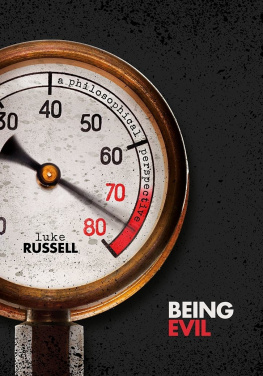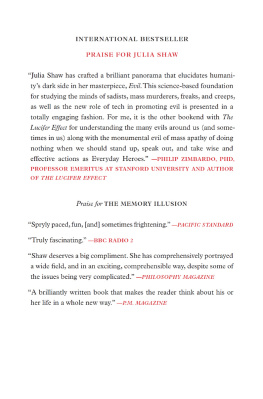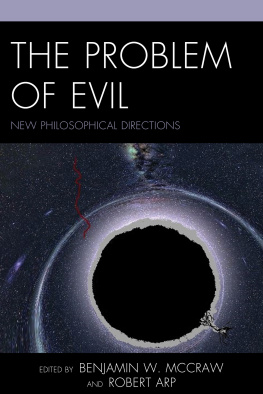EVIL
A Concept in Crisis
ERNIE ROHRBACHER

Copyright 2012, 2015 Ernie Rohrbacher.
All rights reserved. No part of this book may be used or reproduced by any means, graphic, electronic, or mechanical, including photocopying, recording, taping or by any information storage retrieval system without the written permission of the publisher except in the case of brief quotations embodied in critical articles and reviews.
Interior Graphics/Art Credit: www.fotosearch.com
Balboa Press
A Division of Hay House
1663 Liberty Drive
Bloomington, IN 47403
www.balboapress.com.au
1 (877) 407-4847
Because of the dynamic nature of the Internet, any web addresses or links contained in this book may have changed since publication and may no longer be valid. The views expressed in this work are solely those of the author and do not necessarily reflect the views of the publisher, and the publisher hereby disclaims any responsibility for them.
Any people depicted in stock imagery provided by Thinkstock are models, and such images are being used for illustrative purposes only.
Certain stock imagery Thinkstock.
ISBN: 978-1-4525-0170-3 (sc)
ISBN: 978-1-4525-0171-0 (e)
Balboa Press rev. date: 01/19/2015
Contents
To all believers and non-believers: may my words take you far in your quest for knowledge, understanding, wisdom, and truth.
I wish to thank Wayne Coles, Graeme Devenny, Andrew Sellars, and Kane Waterworth for their efforts in making my work flow more easily and in a more logical order; improving my wording and sentence structure to make it more understandable and reader friendly; and finally to FotoSearch.com, for the use of their picture on the front cover of this publication.
Welcome. Evil A Concept in Crisis was primarily written to dispel the myth that evil exists. Furthermore, this book will attempt to explain that evil cannot be real as a base, force, or foundation of existence, by challenging your thoughts, beliefs, and ideas.
You will find philosophical, psychological, scientific, and other evidence to prove evil does not exist. It is intended to disrupt the traditional teachings of those who preach of, and about, evil. Ultimately, I trust this will assist you to become more aware of a greater and more genuine reality.
As a result, this book could change your life. It could open your mind to a higher level of knowledge and understanding. I hope and anticipate that total personal responsibility will be the result, and gone will be the idea of being a victim. If everyone were to embrace the thoughts written here, I wonder what would become of lawyers and religion.
A seemingly new level of spiritual development is emerging in the world. We, mankind, are constantly moving in the direction of increasing potentialwe see this in our jobs, where we do more in less time; in academic, social, and scientific advancement; we hear about it in the sports arena, where a new record is set almost daily. This shift in new and improved ways of doing things has emphasized greater and deeper knowledge and understanding. Spiritually, we are beginning to realize our place and purpose in the universe. For thousands of years, certain eclectic patterns of thought believed in our inner world of intuition, knowledge, and oneness with the universe, and everything external to us was thought to be merely a projection from within ourselves, including things such as the universe itself. If you had a question relating to the outside world, the answer lay within.
Currently, this idea is catching up, as modern scientific advances begin to validate ancient spiritual awareness. It looks like spirituality and science may even go out for a coffee and become friends. You know what they say: it always starts over a cup of coffee.
Around 300 BC, the Greek philosopher Epicurus wrote:
Is God willing to prevent evil but not able? Then he is not omnipotent.
Is he able but not willing? Then he is malevolent.
Is he both able and willing? Then whence cometh evil?
Is he neither able nor willing? Then why call him God?
It may appear that what I am saying here is nothing new, yet the different ways of proving my point are unique. As you go through the book, you will find that the widely accepted structure and processes of God are completely incorrect. Once you discover the new ideas propounded here, you shall find that they are so vastly different from what is taught in the various religions, that there is no room for evil to exist, nor room for religion itself. By the end of reading this book and then remembering Epicuruss quote above, youll probably find that his reasoning is based on current structures of God. Had Epicurus questioned whether the role and structure of God was accurate, I am certain he would have written something else instead. Could it be that this is why I am here?
As you read this book, consider each point as a base or foundation, and, as you begin to think about each idea, try to find a counter-example. Youll probably find you cannot. If you believe people are inherently partly evil, this book will prove otherwise. If you think situations or circumstances are the result of evil, this book will show you differently. Given any situation, circumstance, or incident that could be considered the result of evil, youll discover that each can be covered by one or more concepts, which shows that the motivating factor cannot be evil. Although not made apparent, there are connections between the three main evidence areas. As an example, one could debate that a persons attitude (philosophical view) determines their behaviour (psychological view). Expanding to the scientific views, they could perceive themselves as one with all there is. The ultimate intention is for the reader to arrive at the same or similar understandings as I - that evil not only does not exist, it cannot exist as a core fundamental entity or underlying force. This then must invite us to question the very nature and structure of Satan, and hence God. Are our ideas about Satan and God incorrect?
I like the Abraham Lincoln quote, You can fool all the people some of the time, and some of the people all the time, but you cannot fool all the people all the time. I believe we have all been fooled for a time about the concept of evil. If God and the religious texts of the world are about truth, then truth doesnt require a person to be converted to a particular religion; rather, it requires more for them to be educated. I see this book as one such source of education.
I was inspired by this concept when my sister became a new-born Christian and I heard the totally absurd things she said, which contrasted totally with what I had learned in my personal development training. Prior to this, she was going through a difficult time in her life, and a group of Christians knocked on her door seeking followers. They invited her to one of their congregational meetings. She attended and has since been converted to their way of thinking.
One of the rules in this particular congregation is that couples are not allowed to hold hands or kiss before marriage. Although she disagreed with these ideas, she continued to attend those meetings, especially once she apparently became spirit-filled after speaking in tongues. According to my sister, speaking in tongues meant she was now filled with the spirit of Christ, which is one of the highest achievements for a Christian. I confronted my sister about this, asking how she could be spirit-filled, while I allegedly was not, considering his spirit is everywhere. But if God isnt everywhere, at what point does the spirit-filling endat the end of a hair on her head? And what happens when that hair falls out? Does it end at her skin, and if so, how do her hairs on her head fit into her theory? What happens when a hair falls out? She did not have answers to any of my questions except that this is what her pastor said, and she took his word.
Next page












